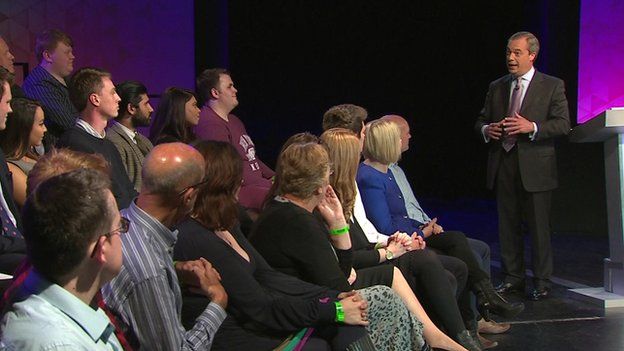Nigel Farage says an EU defeat wouldn't kill UKIP
- Published

A referendum vote to stay in the EU would not make UKIP "redundant", party leader Nigel Farage has said.
Speaking on BBC's Ask the Leader, Mr Farage said UKIP could emulate the SNP, which has risen in the polls since Scotland rejected independence.
And he told Today he could see "no circumstances" in which a deal could be done with Labour, given its opposition to a referendum on EU membership.
But he suggested he could back a Conservative-Lib Dem coalition.
He told the Radio 4 programme: "I won't help Labour. I can't help Labour. There are no circumstances, given that Miliband has turned his back on a referendum."
Analysis: UKIP campaign correspondent Robin Brant
Nigel Farage is toning down expectations. Or so it seems. Maybe it's a canny ploy in the hope that next week UKIP will then exceed predictions. Or maybe he thinks things are dipping as vote day approaches.
On Radio 4 this morning he conceded support had weakened in some areas, although crucially not the target seats the party is really hoping to win. Then there's the "2020 horizon" strategy. It's been much talked about by those at the top of UKIP as the real aim.
But Nigel Farage has given it more prominence in public in recent weeks, including today. On the one hand it reveals a genuine depth in what UKIP is trying to do. But the fact that some of the talk in the final week of the 2015 campaign is about the 2020 campaign reveals that the dream in the aftermath of last year's sensational by-election wins of dozens of MPs has faded.
But, and it's an important but, the benchmark for UKIP is how it did last time. The party got just over 3% of the vote at the last general election. It looks almost certain to exceed that this time.
Mr Farage said he did not want his party to go into coalition.
But he said he would support a "confidence and supply" deal - in which a party is supported through budget and confidence votes - with a Conservative/Liberal Democrat coalition.
"If we have, arithmetically, a position where we can have influence on the basis of confidence and supply, we would do that provided we could get a full, free and fair referendum for this country," he said.
On Thursday night, Mr Farage was one of six leaders facing questions in a series of programmes.
Conservative Prime Minister David Cameron, Labour leader Ed Miliband and the Lib Dems' Nick Clegg took part in a special edition of Question Time, while the SNP's Nicola Sturgeon and Plaid Cymru's Leanne Wood were also questioned as part of the night's programming.
The first question Mr Farage faced was about leaving the European Union. UKIP says it wants a referendum on the UK's membership as soon as possible with equal spending limits and only British citizens able to vote.
Mr Cameron has promised an in/out vote by 2017 if he is prime minister.
Key priorities
UKIP
Main pledges
- Rapid referendum on Britain’s membership of the European Union
- Control immigration with points system, limit of 50,000 skilled workers a year and a five-year ban on unskilled immigration
- Extra £3bn a year for the NHS in England
- No tax on the minimum wage
- Meet Nato target of spending 2% of GDP on defence, and look to increase it “substantially”
Asked by a student in the audience whether his party would be "flawed" if Britain voted to stay in the EU, Mr Farage said: "If it's a full, free and fair referendum I would accept the result.
"Would it make UKIP redundant? No, because just look at what's happened in Scotland. The Scottish rejected their independence referendum but yet the SNP have gone to remarkable heights since then."
Mr Farage said he loved Europe but said it had been "hijacked" by the European Union.
The audience for the programme, filmed in Birmingham, was made up of 25% of people who said they would vote UKIP at the election, with the remainder divided between supporters of the other parties and people who are undecided.
'Neo-colonial'
The UKIP leader was also asked about UKIP's pledge to spend 2% of GDP on defence. He said the world was more uncertain than it had been since the fall of the Berlin Wall and compared the spending to a home insurance policy.
UKIP MPs would make defence spending "a major issue" in Parliament, he said.
The Conservatives and Labour have not said they will meet the 2% Nato target beyond 2016.
On his plans to cut the foreign aid budget to fund the spending pledge, he said there were currently "huge barriers" stopping African nations selling agricultural products to the EU.
"We rape and pillage the fisheries off the west coast of Africa," he added.
"We are behaving in a neo-colonial way to Africa and we assuage our consciences by giving a bit of foreign aid that in nearly every case goes to the wrong people."
Responding to another question about the NHS, Mr Farage said he wanted the service to be "run publicly but properly".
He said there were more people in the country and "we now have fewer GPs per capita than any other country in Europe".
There were two ways of making sure people who turned up for healthcare were eligible, he said - "one is that we would all have to have a health card. Effectively, it would be like an identity card...
"The other option is actually to make sure that anybody that applies for a visa or a work permit before they come into the country proves they've got healthcare".
* Subscribe to the BBC Election 2015 newsletter to get a round-up of the day's campaign news sent to your inbox every weekday afternoon.
- Published30 April 2015
- Published1 May 2015